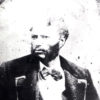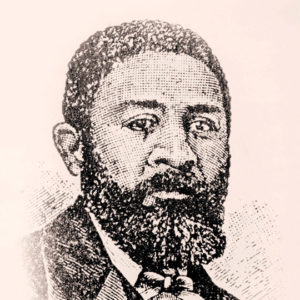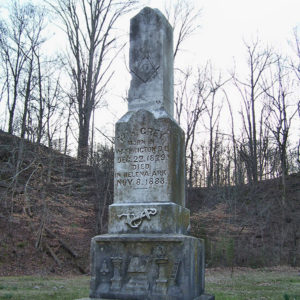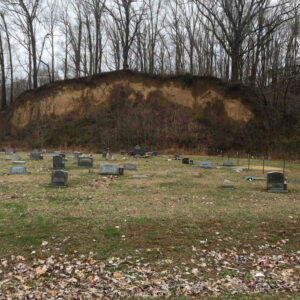calsfoundation@cals.org
William Henry Grey (1829–1888)
William Henry Grey emerged as a leader of African Americans in Arkansas after he settled in Helena (Phillips County) in 1865. Never a slave himself, he was a tireless fighter for the rights of freedmen. His involvement in politics included being a Republican member of the 1868 state constitutional convention and a member of the Arkansas General Assembly, as well as serving as the Commissioner of Immigration and State Lands. In 1872, he became the first African American to address a national nominating convention, seconding the nomination of Republican presidential candidate Ulysses S. Grant in 1872. He was also the first Grand Master of the Most Worshipful Grand Lodge (Colored) of Free and Accepted Masons of Arkansas, established in 1873 from the merger of three different lodges. His career in politics was cut short in 1878 when he apparently suffered a stroke, resulting in paralysis.
William Grey was born in Washington DC on December 22, 1829, as a free man. His parents’ names remain unknown, although he is recorded in census records as a “mulatto,” indicating that one of his parents, most likely his father, was white. He attended the “pay school” of John F. Cook while in Washington. He was also a servant to Congressman Henry A. Wise of Virginia, who affiliated alternatively with the Democratic and Whig parties as a member of the House of Representatives (1833–1844).
Around 1840, Grey’s family moved to Pittsburgh, Pennsylvania, and then to Cincinnati, Ohio. After his parents (most likely his mother and stepfather) died during a cholera epidemic in 1852, Grey moved to St. Louis, Missouri, and was employed as a cook on steamboats traversing the Ohio and Mississippi rivers. In 1854, he married Henrietta Winslow; together they had eight children. In the 1850s, he became a member of the African Methodist Episcopal Church, serving as a minister. By 1865, Grey had relocated to Helena, founding a grocery and bakery, with Oliver Winslow and H. B. Robinson as his business partners.
In 1865, Grey became involved in politics when black Arkansans held a convention in Little Rock (Pulaski County) with the purpose of discussing the future welfare of the state’s black community. He emerged from the convention with the reputation of an elegant, outstanding speaker capable of transmitting deeply held emotions through his words.
In 1867, he was elected as one of four Phillips County delegates to the Arkansas Constitutional Convention of 1868. He joined the convention’s seven other black delegates in supporting the Radical Republican platform promoting the rights of the freedmen. He emerged as the leader of the convention’s black delegates, serving on four standing committees, dealing with boundaries, the elective franchise, education, and the organization of government of cities and villages. He offered one resolution establishing federal aid for the poor and allowing freedmen to homestead government land. He also took to the floor twenty-five times, opposing measures by Conservatives (pro-Confederate Democrats) against the rights of the freedmen.
On January 13, 1868, Grey rose in response to a Conservative measure reinstating the Constitution of 1864, thus depriving African Americans of the right to vote. He proclaimed that blacks had earned citizenship by “right-of-purchase on the numerous battle-fields of our country.” From the Revolution through the Civil War, he asserted, black citizens had stood “unswervingly by our country and the flag.” They had fought for liberty, which could not be secured without their receiving suffrage rights. For their loyalty, the federal government owed them a debt. “We are here,” asserted Grey, “to receive the amount due us from the State of Arkansas. Pay us, sir, the rights and privileges due us as citizens of the United States and the State of Arkansas.” The convention voted 53–10 against the Conservative measure. Grey also spoke against measures forbidding interracial marriage and in favor of issues beneficial to the freedmen.
Grey remained involved in Reconstruction-era politics, serving as a state legislator in 1869. In 1870, he was appointed clerk of the First Circuit Court and ex-Officio Recorder of Deeds. As a delegate to the Republican national convention in 1872, he became the first African American to address a national presidential nominating convention, seconding the nomination of President Ulysses S. Grant. From 1872 to 1874, he served as Commissioner of Immigration and State Lands. On assignment to New York in 1873 to supervise arrangements for Arkansas’s exhibit at the World’s Exposition in the Austro-Hungarian capital of Vienna, he apparently suffered a stroke, forcing him to return to Little Rock. He later served as clerk of Phillips County’s probate and county courts until 1878, when Democrats gained control in Phillips County.
In September 1878, Grey was “struck with paralysis,” probably from another stroke. He never recovered, dying in Helena on November 8, 1888, and is buried in Magnolia Cemetery in Helena. The William H. Grey Gravesite was placed on the National Register of Historic Places in 2019.
For additional information:
Dillard, Tom W. “Three Important Black Leaders in Phillips County History.” Phillips County Historical Quarterly 19 (December 1980–March 1981): 10–21.
Debates and Proceedings of the Convention which Assembled at Little Rock, January 7th, 1868, Under the Provisions of the Act of Congress of March 2d, 1867, and the Acts of March 23d and July 19th, 1867, Supplementary thereto, to Form a Constitution for the State of Arkansas. Little Rock: J. G. Price, 1868.
Foner, Eric. Freedom’s Lawmakers: A Directory of Black Officeholders during Reconstruction. New York: Oxford University Press, 1993.
Palmer, Paul C. “Miscegenation as an Issue in the Arkansas Constitutional Convention of 1868.” Arkansas Historical Quarterly 24 (Summer 1965): 99–119.
St. Hilaire, Joseph M. “The Negro Delegates in the Arkansas Constitutional Convention of 1868: A Group Profile.” Arkansas Historical Quarterly 33 (Spring 1974): 38–69.
Williamson, Llewellyn W. Black Footprints around Arkansas. Hope, AR: Etter Printing Company, 1979.
Todd E. Lewis
University of Arkansas, Fayetteville
 African American Legislators (Nineteenth Century)
African American Legislators (Nineteenth Century) Civil Rights and Social Change
Civil Rights and Social Change Post-Reconstruction through the Gilded Age, 1875 through 1900
Post-Reconstruction through the Gilded Age, 1875 through 1900 William H. Grey
William H. Grey  William Henry Grey Gravesite
William Henry Grey Gravesite  Magnolia Cemetery
Magnolia Cemetery 




Comments
No comments on this entry yet.